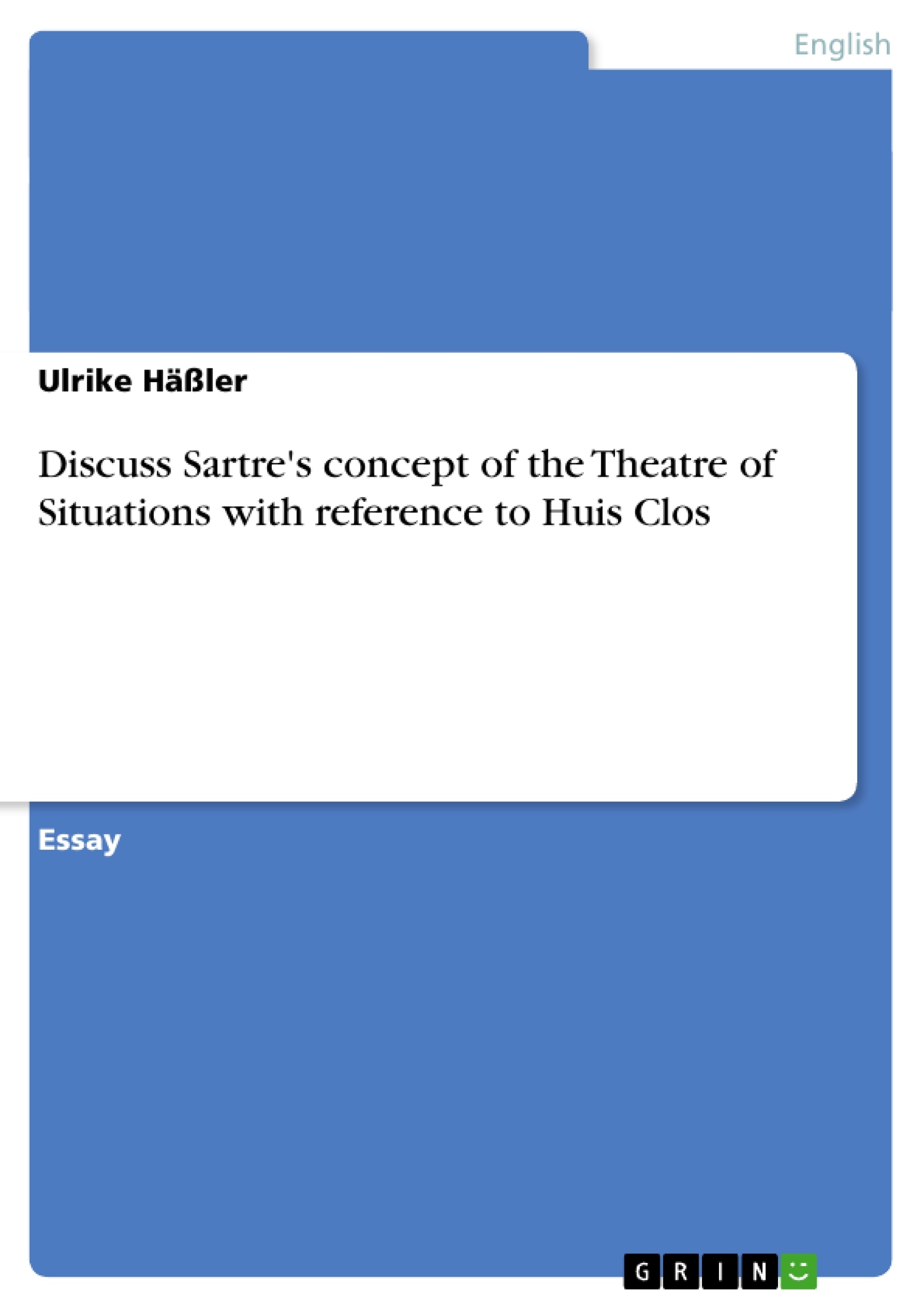Jean-Paul Sartre created a new dramatic concept called the Theatre of Situations which is based on his philosophical work L’Etre et le Néant written in 1943. His existentialism deeply influenced society and intellectuals in particular. According to his specific point of view, man now was only determined by the decisions and actions he makes and nothing else. However, Sartre’s concept of the Theatre of Situations that the angst, which marked the twentieth century, was only faced up with nineteenth century tools. A circumstance which his drama Huis Clos, written in 1943, clearly shows.
Table of Contents
- Sartre's Theatre of Situations
- Existentialism and the Theatre of Situations
- The Concept of Bad Faith
- The Moment of Choice in Drama
- Extreme Situations and the Absurd
- Sartre's Huis Clos
- A Reaction to Bourgeois Drama
- The Setting of Hell
- Hell as a Narrative Tool
- The Significance of "L'enfer, c'est les autres"
Objectives and Key Themes
This text explores Jean-Paul Sartre's dramatic concept of the Theatre of Situations and its application in his play Huis Clos. It aims to examine how Sartre's existentialist philosophy, which emphasizes individual freedom and responsibility, is manifested in his dramatic works. The text also analyzes the relationship between Sartre's dramatic form and his existentialist content, highlighting the limitations of traditional dramatic conventions in expressing his innovative ideas.
- Sartre's Theatre of Situations and its philosophical underpinnings
- The concept of bad faith and its role in human existence
- The significance of the moment of choice in shaping human identity
- The nature of hell and its symbolic representation in Huis Clos
- The interplay between existentialist content and dramatic form in Sartre's works
Chapter Summaries
- Sartre's Theatre of Situations: This chapter introduces Sartre's concept of the Theatre of Situations, outlining its philosophical foundations in existentialism. It explores the central themes of freedom, responsibility, and the moment of choice, highlighting how these concepts shape human existence and dramatic action.
- The Concept of Bad Faith: This chapter delves into Sartre's concept of bad faith, explaining how individuals may evade their freedom and responsibility by turning to external authorities or rationalizations. It analyzes the consequences of bad faith for human authenticity and explores its role in Sartre's dramatic works.
- Sartre's Huis Clos: This chapter examines Sartre's play Huis Clos, analyzing its setting, characters, and narrative structure. It explores the play's representation of hell as a symbolic state of being, highlighting the existentialist themes of freedom, responsibility, and the significance of "l'enfer, c'est les autres."
Keywords
This text explores key themes and concepts related to Jean-Paul Sartre's existentialism, his Theatre of Situations, and his play Huis Clos. It examines concepts like freedom, responsibility, bad faith, the moment of choice, existential angst, the absurd, and the symbolic representation of hell. The text also explores the interplay between traditional dramatic conventions and Sartre's innovative ideas, highlighting the limitations of well-made play structures in expressing his unique vision.
Frequently Asked Questions
What is Sartre's "Theatre of Situations"?
It is a dramatic concept where characters are defined solely by the choices and actions they take when placed in extreme or absurd situations.
How does "Huis Clos" (No Exit) represent this concept?
The play places characters in a symbolic hell, forcing them to confront their freedom, responsibility, and the judgment of others.
What does the famous line "L'enfer, c'est les autres" mean?
"Hell is other people" refers to the existential idea that we are constantly judged by others, which can limit our sense of self and freedom.
What is "Bad Faith" in Sartre's philosophy?
Bad faith is the act of lying to oneself or evading personal responsibility by pretending that one's actions are determined by external factors.
How did Sartre's philosophy influence 20th-century drama?
Sartre's existentialism challenged traditional 19th-century dramatic tools, focusing instead on the angst and choice-making of the modern individual.
- Quote paper
- Ulrike Häßler (Author), 2001, Discuss Sartre's concept of the Theatre of Situations with reference to Huis Clos, Munich, GRIN Verlag, https://www.grin.com/document/43571



